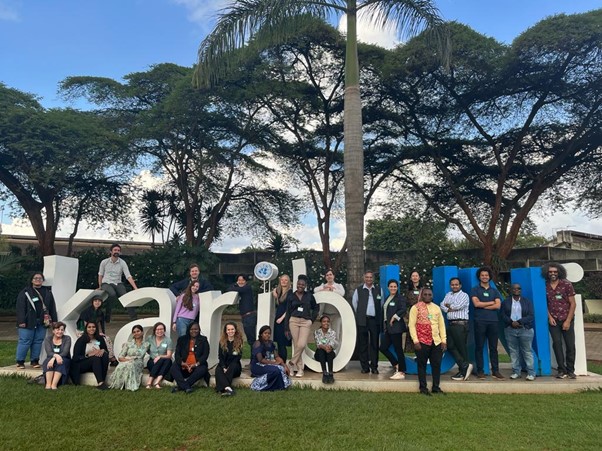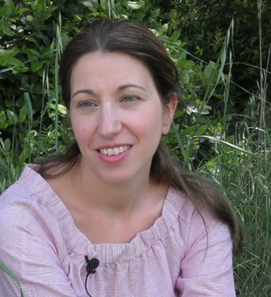To celebrate International Women’s Day, Journal of Applied Ecology is excited to share a collection of short posts showcasing the work of some of our new Associate Editors. In each post, our Editors discuss their experiences in ecology, as well as what this year’s theme, ‘Inspire Inclusion’, means to them.
Dr Raquel L. Carvalho
What work do you do?
I am a postdoctoral researcher at the University of São Paulo. My expertise lies in the intersection of biodiversity ecology and ecosystem conservation, particularly in tropical areas. My research focuses on understanding the impacts of human-driven disturbances, climate-related stressors, and landscape structure on biodiversity and ecosystem functioning.
Recently, I have also been involved in synthesis research concerning Amazonian terrestrial and aquatic biodiversity, aimed at informing decision-making processes.
How did you get into ecology?
I got into ecology during my undergraduate studies. I had a professor (Dr. Sérvio Pontes Ribeiro), who enchanted me with his classes/explanations about tropical forest canopies, and who encouraged me to enter the world of ecology.
What is your proudest achievement?
I led an article with approximately 500 authors, ‘Pervasive gaps in Amazonian ecological research’. Communicating with such a large number of authors was challenging, but I am proud to have successfully managed it and contributed to its publication. Additionally, about four months later, this article was used to inform financial agencies on where to subsidize future research.
What does ‘Inspire Inclusion’ mean to you?
Inspire Inclusion to me means actively promoting and fostering an environment where all individuals feel valued, respected, and empowered regardless of their background, identity, or differences. It involves creating opportunities for diverse voices to be heard, embracing varying perspectives, and ensuring equitable access to resources and opportunities for everyone.
Who inspires you?
Two supervisors/collaborators whom I had in the past (Ronara Ferreira and Ellen Andresen) inspire me, as both are women with children, and they are highly fair and competent scientists. Their dedication inspires me to strive for excellence in my own scientific pursuits.
Dr Karen Castillioni
What work do you do?
I am an Associate Editor mentee for Journal of Applied Ecology and also a Postdoctoral Research Associate at the University of Minnesota, USA. In my current research program, I am exploring the complex relationship between biodiversity and ecosystem functioning in the context of global change.

How did you get into ecology?
Growing environmental challenges and concerns about biodiversity loss and climate change motivated me to delve deeper into ecology. I recognized the urgent need for solutions to these complex issues, and studying ecology seemed like a meaningful way to contribute to environmental conservation and sustainability efforts.
What is your proudest achievement?
I am proud to work in some of the most relevant experiments at the Cedar Creek Ecosystem Science Reserve, a renowned research facility that conducts groundbreaking studies on biodiversity, ecosystem dynamics, and climate change. Growing up in Brazil, it was always a dream of mine to work there and I never thought it could become a reality someday.
What does ‘Inspire Inclusion’ mean to you?
To me, ‘Inspire Inclusion’ means promoting empathy, understanding, and open-mindedness towards others. It’s about actively listening to diverse viewpoints, seeking to understand different perspectives, and building bridges of communication and collaboration.
Who inspires you?
I’m inspired by women from underrepresented groups who defy expectations and achieve leadership roles. Their resilience and ability to drive positive change motivate me. Their stories show that diversity in leadership is crucial and that barriers can be overcome. I admire their courage and commitment to creating a more inclusive world.
Dr Luzhen Chen
What work do you do?
I am a Professor at the College of the Environment and Ecology at Xiamen University. My research focuses on understanding the impacts of climate change on the coastal wetland ecosystems and carbon accumulating functions of mangroves and saltmarshes.
How did you get into ecology?
I developed an interest in ecology during my undergraduate studies. I was fascinated by the complexity of ecosystems and how they functioned. This led me to pursue a PhD in ecology, where I had the opportunity to conduct field research and contribute to the scientific community.
What is your proudest achievement?
One of my proudest achievements is receiving the Outstanding Scientists and Technologists in the Ecological Society of China. This recognition of my work in the field of ecology was a significant milestone in my career and motivated me to continue pursuing my research goals.
What does ‘Inspire Inclusion’ mean to you?
It is essential to create a diverse and inclusive community in the field of ecology to ensure that different perspectives and experiences are represented and valued.
Who inspires you?
I am inspired by women scientists who have paved the way for future generations of women. Their dedication, resilience, and accomplishments serve as a constant reminder of what is possible when we pursue our passions and dreams.
Dr Romina Fernandez
What work do you do?
I am an ecologist with a broad interest in plant ecology and biological invasions. Currently, my research focuses on understanding the factors influencing the distribution of invasive plants in protected areas, quantifying the impacts of non-native invasive plants on biodiversity and ecosystem functioning, and studying the underlying mechanisms.
How did you get into ecology?
My first step into ecology involved a project on leaf litter decomposition comparing native and exotic species. This project was spearheaded by an ecology professor at my University. During one of her classes, she mentioned the need for volunteers, and I recall being drawn to the topic, prompting me to sign up to participate. That marked the inception of my journey into ecology projects, many of which have been focused around plant invasions.
What is your proudest achievement?
Although I take pride in each of my academic accomplishments, I consider my participation as an IPBES fellow in the global assessment on invasive alien species to be my greatest achievement. Encouraged to apply for this opportunity, I had the privilege of collaborating with an amazing international team of scientists. This experience not only provided me with invaluable learning opportunities but also played a key role in enhancing and refining my academic skills.
What does ‘Inspire Inclusion’ mean to you?
For me, “inspire inclusion” means creating spaces where everyone feels respected and valued, where everyone has equal opportunities, and where all voices are heard and appreciated, regardless of gender, race, or age.
Who inspires you?
I draw inspiration from individuals who approach their work with passion, kindness, and a positive attitude. I admire those who exhibit leadership skills, have the ability to create a conducive environment for collaborative work, and ensure that every individual involved feels valued.
Moreover, I am inspired by those who maintain a healthy balance between their professional and personal lives. Throughout my journey, I have been fortunate to meet and work with such individuals, including my PhD advisors, Roxana Aragón and Natalia Pérez Harguindeguy; my advisor of the stays I did in Spain Pilar Castro Díez, my mentor of the IPBES fellowship program Martín Nuñez, the leader of the InvaCost project Franck Courchamp and many other amazing people!
Dr Elena Kazakou
What work do you do?
I am a professor of functional ecology, trying to combine both teaching and research.
How did you get into ecology?
Through my education, especially my Masters and PhD.
What is your proudest achievement?
When my PhD students find permanent positions in education and research. Also, when my student’s manuscripts are accepted for publication.
What does ‘Inspire Inclusion’ mean to you?
Creating environments where all women are valued and respected; making changes for equality to allow the success of women (equality); creating opportunities that permit women and girls to have quality education and training; and elevating and encouraging girls’ participation and achievement in education, sport, art, etc.
Who inspires you?
Women inspiring inclusion!
To read more about International Women’s Day across the British Ecological Society’s journals, click here. To find out more about our Editorial Board, click here.









